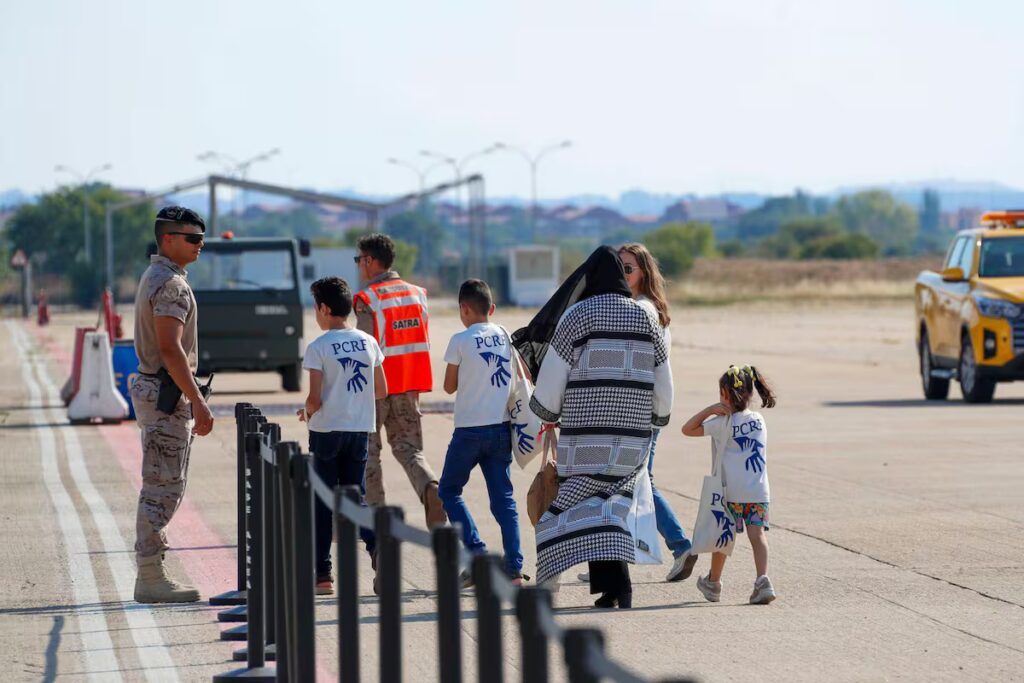
Nearly a hundred Palestinians who are in Egypt after fleeing Gaza due to the war have submitted requests for transfer to Spain to the Spanish embassy in Cairo in recent months to seek international protection for the country. The Gazans, 84 in total, including some entire families, find themselves in a situation of serious legal helplessness in the Arab country, according to their team of lawyers, and base their request on an article of the Spanish asylum law that provides for this type of safe movement.
Among the applicants there are some pregnant women, sick and uneducated minors and elderly people in serious conditions, according to what the group representing them, LegalAid38, reports in an email to El PAÍS. “They find themselves in a situation of serious vulnerability in Egypt, where it is practically impossible to obtain a residence permit, (which) in turn prevents access to education, healthcare and other fundamental rights,” they say from the group, which assures that they are studying 48 further applications.
To prevent those fleeing their country from having to risk their lives to find refuge in Spain, the 2009 asylum law establishes that Spanish ambassadors can authorize a safe transfer in order to make this request. The law establishes only two requirements: that the applicant is not a citizen of the country where the Spanish embassy is located and that his physical integrity is in danger. In 2024, a Supreme Court ruling clarified that this danger to physical integrity refers only to the situation in the country of origin and not to that of transit.
The group’s legal team assures that the first 10 requests were submitted more than three months ago and that they did not receive any response from the Administration once the deadline to do so expired. The group states that after this period it will consider the applications rejected due to negative administrative silence and will study filing an administrative dispute appeal. EL PAÍS has learned that in the second half of November the Spanish embassy in Cairo began conducting interviews with some applicants.
The Palestinians’ claims began to be submitted after those of 26 other Gazans were all approved and they were allowed to travel to Spain earlier this year to seek asylum. From LegalAid38 they specify that they followed “exactly” the same steps as the legal representative of that group. “(The current) absolute silence leaves many families in a situation of very serious vulnerability,” they denounce.
After remaining in limbo for months, most Gaza families who submitted a request to the Spanish embassy in Cairo to move to Spain to seek asylum in mid-2024 had their requests approved and began traveling to the peninsula last April. Contacted by EL PAÍS, the Spanish Ministry of Foreign Affairs limited itself to specifying, regarding this new group of Palestinians who intend to go to Spain to formalize their asylum request here, that “the transfer requests presented pursuant to Article 38 to the Embassy in Cairo are ongoing or will be processed”.
Impotence in Egypt
Although the situation in the transit country does not fall within the criteria for the applicability of Article 38 of the Spanish Asylum Law, many Gazans who fled to Egypt in the first months of the war find themselves in a very vulnerable situation. The majority entered the country with an ordinary visa without the possibility of renewing it, and therefore remain without residency. This prevents them from working, accessing basic services such as healthcare and education, signing a lease, opening a bank account or contracting a telephone line. Furthermore, the majority paid large sums of money to leave Gaza, which represented a great financial effort.
Egypt does not recognize the mandate of the United Nations Refugee Agency (UNHCR) to Palestinian citizens, so they cannot register. And the United Nations agency for Palestinian refugees, UNRWA, does not operate in Egypt. The authorities of the Arab country have also deported hundreds of Sudanese and Eritrean citizens in the past despite the risk to their lives in their respective countries of origin.
One of the applicants, a 27-year-old from Gaza City who worked in a telecommunications company and fled the Strip in February 2024, recalls: “Every night we thought we were dying.” The woman complains that in Egypt “life is extremely difficult for anyone coming from Gaza without legal status” and underlines that “starting from scratch in a country where you cannot work or have residency or health insurance is impossible.”
Another applicant, a 38-year-old man from Gaza City who also worked in the telecommunications sector, explains that he decided to flee to Egypt in April 2024 with his wife and five children after an Israeli bombing destroyed the building next to them and he had to save a child with an amputated leg from the rubble. “I dream of giving my children the life they deserve: with health, safety and education,” she says.
The asylum seekers’ legal team assures that in Egypt their clients are facing “extremely precarious” living conditions that especially affect the youngest children, who “have been without education or the possibility of socializing in safe environments for more than three years”. They also denounce that lack of access to healthcare is generating “life-threatening situations for many people”, particularly among those suffering from chronic or serious illnesses.
“All of this represents a new victimization of people who have already suffered extreme violence, forced displacement and irreparable losses,” underlines the LegalAid38 team. “After having survived indiscriminate attacks, the destruction of homes and the loss of family members, they are now once again exposed to a context of lack of protection, exclusion and prolonged suffering,” indicates the group, which describes the situation and its clients’ cases as “a humanitarian and legal emergency”.
Some of the asylum seekers contacted by this newspaper also expressed concern about the impact on their claims of the ceasefire reached in Gaza in mid-October and which Israel has violated on an almost daily basis. Since then, dozens of people have been killed in Israeli attacks as Hamas has regained some control.
“Gaza is in ruins, even if the war ended, there would be nowhere to return to,” says another of the claimants, a 38-year-old man from Gaza City who fled the Strip at the end of March 2024. “Staying there is dangerous for Israel and Hamas,” insists the Gazan, who explains that years before the war he had been briefly detained and interrogated by the Palestinian group. “(Israel) disconnected us from everything we were attached to; I have nothing left,” he adds, but in Egypt “we are in limbo” and “we deserve the opportunity to lead a normal life,” he adds.
The applicant from Gaza City consulted by this newspaper also acknowledges that in Egypt her life “is stagnant” and that she is “totally alone”. “Weeks go by without me speaking to anyone or leaving the house. When I saw the opportunity to rebuild my life elsewhere, I took it, because I don’t know what to do. I’ve thought about ending my life more than once. I can’t continue living like this,” he concludes.




